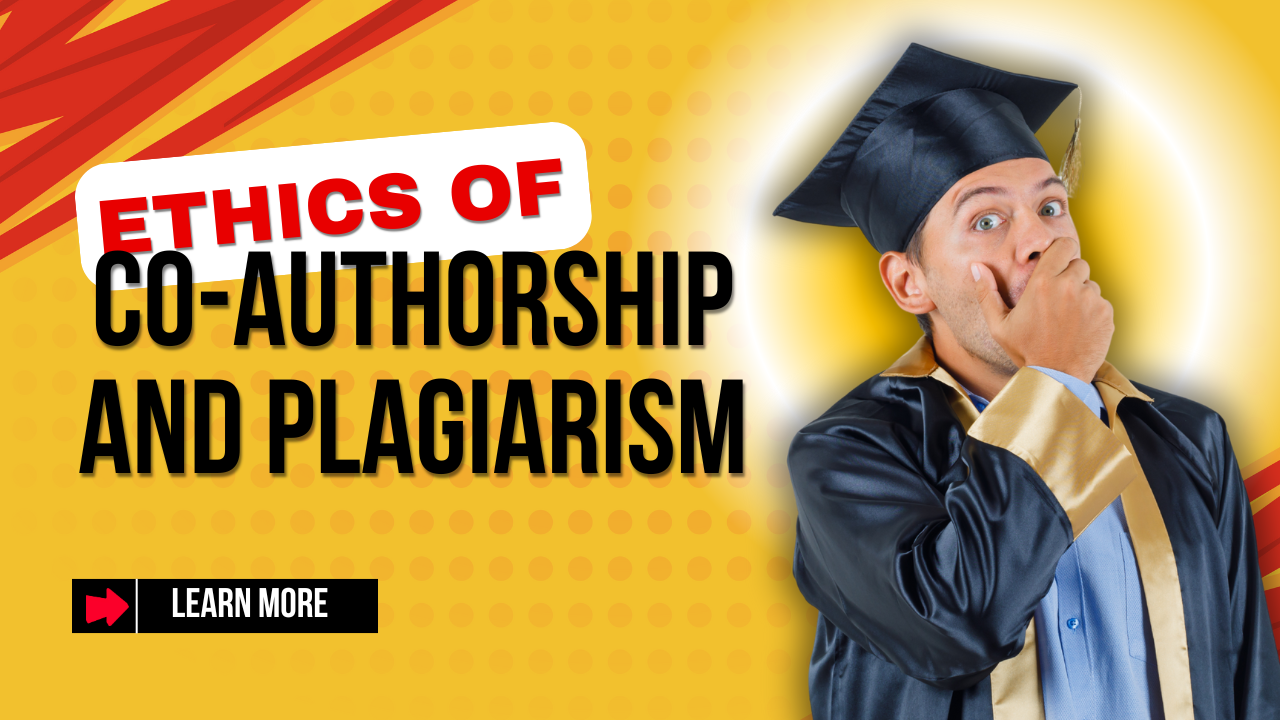Ethics of Co-Authorship and Plagiarism: A Complete Researcher’s Guide 2025
Kenfra Research - Bavithra2025-10-14T17:01:56+05:30In today’s academic world, understanding the Ethics of co-authorship and plagiarism is essential for every researcher. Whether you are a PhD student, a scholar, or an experienced academic, maintaining ethical standards in your research builds credibility, transparency, and trust. Collaborative research requires fair recognition of contributions, and avoiding plagiarism ensures your work is original, respected, and impactful.
When multiple authors work together, clarifying roles, responsibilities, and authorship order from the start is crucial. Ethical co-author practices prevent conflicts, protect intellectual property, and encourage responsible research collaboration. Similarly, preventing plagiarism shows academic honesty and transparency, making your work trustworthy in the scholarly community.
What is Co-Authorship Ethics in Research?
Co-authorship ethics is about recognizing each contributor fairly and responsibly. Researchers should follow authorship guidelines for researchers and ensure that every participant’s contribution is transparent. Key principles include:
- Clearly defining the contribution of each author
- Open communication about responsibilities and expectations
- Agreement on author order before submission
- Avoiding “guest authorship” or “gift authorship,” where someone is included without significant contribution
Neglecting co-authorship ethics can lead to authorship disputes, allegations of research misconduct, and reputational harm. Maintaining research integrity and ethical co-author practices is essential to protect the credibility of your work and collaborations.
Why Research Integrity Matters?
Research integrity is the foundation of ethical publishing. It requires honesty in data collection, analysis, and reporting. Misconduct, such as falsifying data or misrepresenting contributions, can have serious consequences, including paper retraction and reputational damage. Upholding academic integrity strengthens scholarly publishing and builds trust in research outcomes.
Understanding Plagiarism in Academic Writing
Plagiarism occurs when someone presents another person’s ideas, words, or data as their own without proper acknowledgment. Both intentional and unintentional plagiarism are considered unethical. Avoiding plagiarism in research papers is crucial for maintaining academic honesty.
Researchers should use plagiarism detection tools for researchers in 2025 to verify originality. Proper citation, paraphrasing, and acknowledgment of sources are essential steps. Understanding how plagiarism affects research reputation and credibility helps researchers uphold ethical publishing standards.
Examples of plagiarism include:
- Copying text from published papers without citation
- Using someone else’s data without permission
- Paraphrasing without proper acknowledgment
Taking proactive steps to prevent plagiarism enhances the quality and trustworthiness of research.
Common Ethical Challenges in Co-Authored Research
Collaborative research can present challenges such as:
- Disagreement on author order
- Inclusion of authors who did not contribute meaningfully
- Miscommunication about responsibilities
- Conflicts over data ownership
How to Handle These Challenges?
- Maintain open communication among co-authors
- Document contributions clearly
- Follow institutional and journal guidelines
These steps prevent conflicts and ensure fairness in research collaboration.
Guidelines for Ethical Authorship
Following clear guidelines ensures fair co-authorship and reduces conflicts. Researchers should:
- Define author contribution statements for clarity
- Confirm authorship before manuscript submission
- Cite all sources properly to avoid plagiarism
- Seek ethical approval when necessary
- Maintain transparency in data sharing and research processes
Ethical publishing is not just about avoiding plagiarism; it involves respecting intellectual property, following research ethics policy, and ensuring all authors are fairly recognized.
Tools and Strategies to Avoid Plagiarism
Several tools and strategies help researchers maintain originality and academic honesty:
- Plagiarism detection software for research papers
- Proper paraphrasing and citation techniques
- Accurate tracking of references and data sources
- Peer review to improve ethical writing practices
By using these strategies, researchers can comply with publication ethics in academia and strengthen their professional credibility.
The Role of Communication in Ethical Co-Authorship
Communication is key to responsible research collaboration. Regular discussions, written agreements, and transparent conversations about contributions prevent misunderstandings and authorship disputes. Co-authors should discuss research expectations, manuscript structure, and publication timelines openly.
Academic Honesty and Transparency
Maintaining academic honesty and transparency ensures that your work contributes meaningfully to the scholarly community. Ethical co-authorship and plagiarism prevention are vital aspects of research integrity. Scholars should:
- Give proper credit to all sources
- Follow publication ethics in academia
- Take responsibility for their contributions
- Avoid exaggerating their role in the research
These practices protect researchers from misconduct allegations and support the advancement of credible, trustworthy research.
Benefits of Following Ethical Practices
Adhering to ethical practices in co-authorship and plagiarism provides several benefits:
- Enhanced credibility: Ethical research earns respect from peers and institutions.
- Reduced conflicts: Clear guidelines prevent disputes among co-authors.
- Increased trust: Transparent research practices foster trust in the academic community.
- Better career growth: Researchers with integrity are more likely to publish in high-impact journals.
These benefits make ethical research practices not just a requirement but a valuable investment in your academic career.
Conclusion
Understanding the Ethics of co-authorship and plagiarism is essential for researchers in 2025. Ethical collaboration, transparency, and proper acknowledgment of contributions prevent disputes and strengthen academic reputation. Using plagiarism detection tools, following authorship guidelines, and maintaining open communication are key strategies for responsible research collaboration.
Kenfra Research encourages scholars to prioritize ethical practices to ensure their work is respected, credible, and aligned with global standards in scholarly publishing. Upholding ethics in co-authorship and plagiarism not only safeguards your reputation but also contributes to a trustworthy and transparent academic environment.







Leave a Reply